Newsletter 2019/3
August 2019
Introduction
This summer’s newsletter comes at the close of a rather busy three months in which the Tribunal has dealt with two provisional measures cases: the Case concerning the detention of three Ukrainian naval vessels (Ukraine v. Russian Federation), Provisional Measures, involving the detention of the “Berdyansk”, the “Nikopol” and the “Yani Kаpu” and twenty-four servicemen; and The M/T “San Padre Pio” Case (Switzerland v. Nigeria), Provisional Measures, relating to a dispute over the arrest of a Swiss-flagged tanker in Nigerian waters. The Orders in each of these cases were delivered within a short time-frame, as required by the Rules of the Tribunal.
With respect to the Case concerning the detention of three Ukrainian naval vessels, the reports on compliance with the Tribunal’s Order were duly submitted by both Parties. The merits of the dispute were submitted to Annex VII arbitral proceedings and, on 12 June 2019, I was requested by the Agent of Ukraine to appoint three members of the arbitral tribunal and designate as president one of the three members appointed. This function of appointing authority is bestowed upon the President of the Tribunal by Annex VII to the United Nations Convention on the Law of the Sea if the parties to arbitral proceedings are unable to reach agreement on the appointment of one or more of the three other members of the arbitral tribunal, or on the appointment of the president of the arbitral tribunal.
In The M/T “San Padre Pio” Case the reports on compliance with the Tribunal’s Order were duly submitted by both Parties to the case and I am gratified to see that the Tribunal has assisted the Parties on their path to a peaceful settlement of the dispute.
Regarding non-judicial activities, the annual Meeting of States Parties to the United Nations Convention on the Law of the Sea took place in New York in June, an occasion I look forward to as it provides an opportunity to meet with many delegations face-to-face, to discuss the Tribunal’s work, and to clarify our procedures. The meeting this year celebrated the 25th anniversary of the entry into force of the Convention and many delegations praised the Convention - to cite the Report of the 29th Meeting of States Parties (SPLOS/29/9) - “as one of the most successful international treaties ever negotiated and as a milestone for international cooperation and multilateralism”, stressing that “the Convention struck a careful balance between the freedoms, rights and obligations of States parties, as well as among the diverse interests of States, and served as a cornerstone of the rule of law in international relations.” Pursuant to my report to the Meeting on the recent work and developments of the Tribunal, many delegations underscored “the significant contribution of the Tribunal to advancing peace and security, the rule of law and the development of international jurisprudence on the law of sea” and a number of delegations “noted with appreciation the important contributions of recent judgments of the Tribunal” and the increasing diversity of cases brought before it. The meeting highlighted “the critical contribution of the Tribunal to ocean governance”, in addition to “the potential role of the Tribunal with regard to an international legally binding instrument under the Convention on the conservation and sustainable use of marine biological diversity of areas beyond national jurisdiction”.
In London at the end of June I had the opportunity to give a statement to representatives of the maritime world gathered at the International Maritime Organization to celebrate the 30th anniversary of the International Maritime Law Institute in Malta. I was pleased to have the opportunity to congratulate the Director of the Institute, Professor David Attard - who of course is also Vice-President of the Tribunal - on the great success the Institute has achieved as a world-renowned centre for the training of experts in international maritime law over the past three decades. The Tribunal considers that capacity building in the law of the sea and dispute settlement is of great importance and that the rule of law at sea and effective ocean governance can be greatly strengthened through training and building expertise and capacity.
In Kingston (Jamaica) in July, I attended the Special Assembly organized by the International Seabed Authority to mark the 25th anniversary of the entry into force of the Convention and the establishment of the Authority. On that occasion, I had the opportunity to speak on the contentious and advisory jurisdiction of the Seabed Disputes Chamber of the Tribunal and to reiterate that this Chamber stands ready to play its part, as an independent and impartial judicial body, in the implementation of one of the most profound concepts of the Convention, the common heritage of mankind, and in the further development of the legal regime governing the Area and its resources.
Towards the end of July the Tribunal welcomed six fellows who embarked on their nine-month ITLOS-Nippon Foundation capacity-building and training programme on dispute settlement under UNCLOS, as well as 35 other participants in the Summer Academy. It is always a pleasure to see the building buzzing with young and energetic students from all over the world, keen to learn more about the law of the sea and maritime law from the faculty of judges, professors and practitioners.
I close with a few words on the departure of our long-serving Registrar, Mr Philippe Gautier, who has decided to move on to take up a new challenge as Registrar of the International Court of Justice. Marking his departure with the presentation of a commemorative plaque on behalf of the Members of the Tribunal, I was able to express our gratitude for his engagement and contribution to the Tribunal since his first appointment in 1997. With effect from 1 August 2019, the Deputy Registrar, Ms Ximena Hinrichs Oyarce, serves as Acting Registrar pursuant to article 37, paragraph 1, of the Rules of the Tribunal.
With my warmest regards,
Jin-Hyun Paik
President
ITLOS Cases
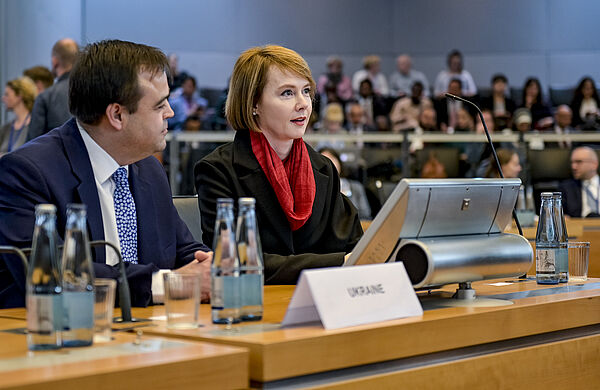
The Order in the Case concerning the detention of three Ukrainian naval vessels (Ukraine v. Russian Federation), Provisional Measures was delivered on 25 May 2019.
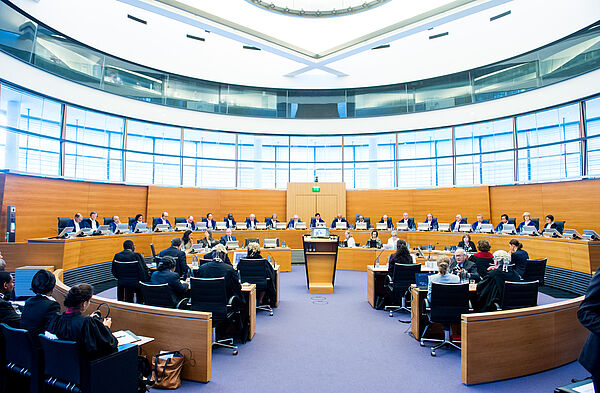
The Order in The M/T “San Padre Pio” Case (Switzerland v. Nigeria), Provisional Measures was delivered on 6 July 2019.
Farewell interview with Philippe Gautier, Deputy Registrar from 1997 to 2001, Registrar from 2001 to 2019
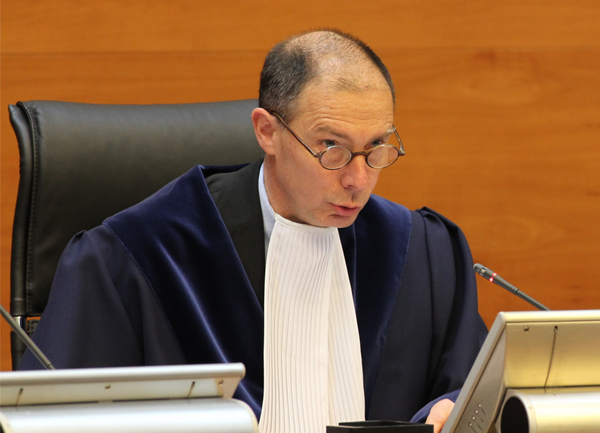
After 22 years at ITLOS, I shall be leaving my post as Registrar of the Tribunal at the end of July 2019 and taking up my duties at the International Court of Justice (ICJ) in The Hague. I remember very well my first days in Hamburg, in January 1997. It was an ice-cold winter and the Alster had frozen over. The time here has just flown by and these 22 years have passed (too) quickly. I have to say that the role of registrar is particularly demanding: one has to ensure that cases proceed in the proper fashion, assist with the judicial work, and make sure that the administrative side runs smoothly. At the same time, the job is a fascinating one and one learns something new every day.
From the point of view of judicial work, my years in Hamburg have been very busy (apart from a 2-3 year dip) and I was able to follow closely the 27 cases submitted thus far to the Tribunal. The MOX Plant case (2001) was especially memorable: this was my first case as registrar and a time I will never forget. Working in close collaboration with the president, judges and members of the drafting committee is something which is both stimulating and highly enriching.
Although I have a certain bent for legal work, I must also admit that experience has shown me that issues to do with staff, the budget and the administrative organization of an international secretariat are of crucial importance. It is certainly one of the main lessons my years in Hamburg have taught me. In this regard, I have to thank my colleagues in the Registry for their efficiency and professionalism, in particular when it comes to urgent cases. We have a small but effective team. Seeing what a team of 38 people can achieve is very impressive!
I shall leave Hamburg with a certain sense of nostalgia but, after all these years, it was time for me to take up different challenges - something which the ICJ will certainly present me with.
That being said, I am sure that the Tribunal’s future will be bright. It is now an internationally recognized institution and the fact that it has dealt with three cases this year (two of which were consecutive urgent proceedings) shows what a vibrant institution it is. On that note, it is interesting to see that more and more cases concerning the detention of ships are being submitted to ITLOS. This highlights the specific role which the Tribunal can play but, in my opinion, its role is not limited to this type of case. For example, the Tribunal’s competence in the field of protection of the marine environment should also encourage States to make use of ITLOS’s jurisdiction in consultative and contentious proceedings.
I leave Hamburg with a debt of recognition - to the various presidents under whom I have served and who always supported me and offered me advice, to the judges for the trust they placed in me during the 18 years of my mandate as registrar, and, of course, to my colleagues in the Registry for their courtesy and the quality of their work.
ITLOS conferences and events
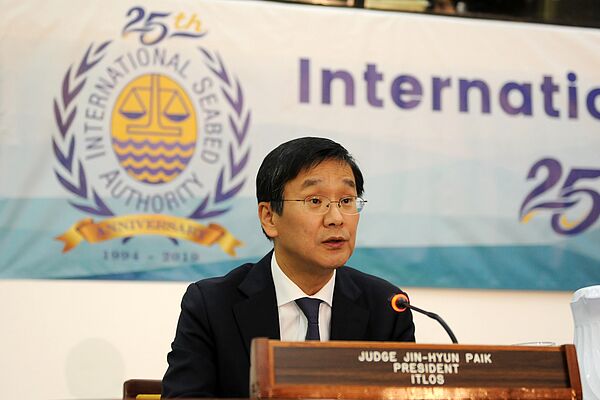
President Paik gave a statement to the 29th Meeting of States Parties in New York on 14 June 2019, introducing the Annual Report for 2018.
While in New York, the President presented his paper “Some thoughts on dispute settlement under a new legal instrument on the conservation and sustainable use of marine biological diversity of areas beyond national jurisdiction”, at the Permanent Mission of Germany to the United Nations in New York on 19 June 2019.
At the invitation of Mr Kitack Lim, Secretary-General of the International Maritime Organization, President Paik attended a special event commemorating the 30th anniversary of the International Maritime Law Institute in London on 25 June 2019 and delivered the keynote speech, “The rule of law and the importance of capacity building”.
Further celebrations were held in Kingston (Jamaica) to mark the 25th anniversary of the entry into force of the Convention and the establishment of the International Seabed Authority. President Paik addressed the delegates attending the meeting on the contentious and advisory jurisdiction of the Tribunal’s Seabed Disputes Chamber.
- Statement
Capacity Building
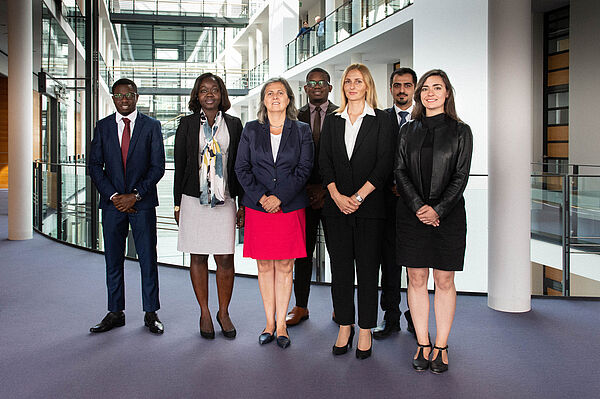
ITLOS-Nippon capacity-building and training programme on dispute settlement under UNCLOS
After a stringent selection process, Mr Nayef Alshaikh (Bahrain), Ms Paula Balmaceda (Chile), Mr Joshua Benn (Guyana), Mr Meles Esmel (Côte d’Ivoire), Ms Gyamfuaa Mac-Owoo (Ghana) and Ms Deima Savukynaite (Lithuania) were selected to be the Tribunal’s fellows for the 2019/2020 programme.
The fellows arrived in July and participated in the IFLOS Summer Academy. Over the nine months of the programme they will complete modules on: an introduction to dispute settlement; dispute settlement under the Convention; bringing a case to the Tribunal; maritime delimitation practical skills; the jurisprudence of the Tribunal; environmental law; maritime law; institutions established under the Convention and other relevant organizations; and current issues in the law of the sea; with a series of lectures, workshops, training sessions and study visits. The fellows will also prepare research papers for presentation to the Judges of the Tribunal in March 2020. We look forward to accompanying the fellows on this journey.
Internship programme
The outgoing group of interns, Ekaterina Antsygina (Russian Federation), Joseph Ouaga (Côte d’Ivoire), Laurène Simon (France) and Sindhura Polepalli (India), relished the opportunity to follow two provisional measures cases during their three-month internship at the Tribunal. They were able to support the Legal Office with background research and had the opportunity to attend the hearings in both cases. Their own research papers touched on the following topics: A case of competing entitlements for continental shelves within and beyond 200 nautical miles: does the distance criterion prevail?; Elévation du niveau de la mer et submersion de territoires: quelles conséquences pour les Etats et les populations?; The dispute settlement framework under UNCLOS: India’s prospects; and La préservation de la zone côtière en droit ivoirien.
On 1 July 2019 we welcomed Mr Carlos Cruz Carrillo (Mexico), Mr N'kouleté Yaovi Kpadenou (Togo), Ms Mariam Mgeladze (Georgia) and Mr Aref Shams (Iran) to the Tribunal, all of whom will be serving their internships with the Legal Office. The summer interns have the opportunity to participate in some of the Summer Academy events and lectures as well as the moot court in the final week. They will also be able to attend some of the ITLOS/Nippon Foundation programme lectures and join the visits to local organizations arranged for the fellows.
IFLOS Summer Academy
The Tribunal hosted the 13th IFLOS Summer Academy “Promoting ocean governance and peaceful settlement of disputes” at its seat in Hamburg. 41 participants from 28 States attended four weeks of lectures given by Judges, professors, practitioners and professionals from the law of the sea and maritime fields. The faculty in the first two weeks included President Paik, Registrar Gautier, Deputy Registrar Hinrichs, Vice-President Attard, Judges Lijnzaad and Heidar, and former Judges Wolfrum and Eiriksson.
The Academy is often a time of reunions: from our ITLOS alumni we are happy to see Thaissa Meira from Brazil (intern, 2018) and one of our current interns, Mariam Mgeladze from Georgia, participating in the Academy this year. IMLI alumni are also well represented at the Academy, with six participants from the Institute. We note with pleasure how both the ITLOS and IFLOS alumni networks are growing steadily.
Regional workshops
We are pleased to have a new date for the Montevideo workshop. Postponed from May owing to the submission of the Case concerning the detention of three Ukrainian naval vessels (Ukraine v. Russian Federation), the workshop will now take place on 13 and 14 November 2019. President Paik, Judges Kelly, Cabello and Heidar and Acting Registrar Hinrichs are looking forward to meeting the workshop participants there.
Capacity building further afield
The Tribunal’s involvement in the capacity-building programmes of other institutions in New York and Malta continued during this period. Registrar Gautier gave a briefing for the fellows of The United Nations - The Nippon Foundation of Japan Fellowship Programme/Human Resources Development and Advancement of the Legal Order of the World's Oceans on 14 June 2019 at United Nations Headquarters. Deputy Registrar Hinrichs travelled to Valetta to give a lecture on fisheries law to the participants in the International Fisheries Law Training Course run by the International Maritime Law Institute (IMLI) of the International Maritime Organization in collaboration with the Food and Agriculture Organization of the United Nations on 9 July 2019.
Meet ITLOS Alumni
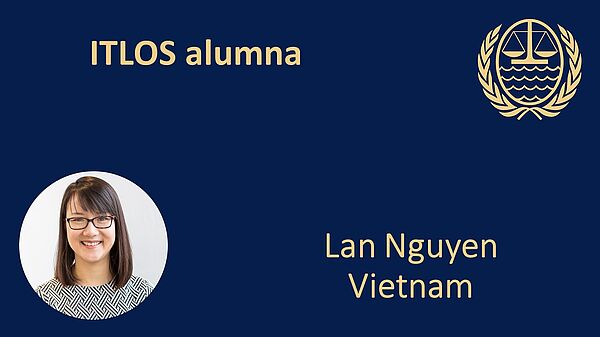
Lan Nguyen (Vietnam), intern in 2012, assistant professor in public international law and research associate at The Netherlands Institute for the Law of the Sea, Utrecht University, The Netherlands
I started my internship at ITLOS in October 2012, just a few months after completing my LLM in public international law. My interest in an internship at ITLOS was triggered by my earlier work as a lecturer and researcher in international law at the Diplomatic Academy of Viet Nam and my Master thesis, which looked at the applicability of UNCLOS dispute-settlement procedures to the South China Sea dispute. Having examined the UNCLOS dispute-settlement procedure from a theoretical perspective, I was very eager to learn more about how ITLOS functions in practice.
During my time at ITLOS, my co-interns and I attended the oral hearings and assisted the legal officers in the M/V “Louisa” Case. A few weeks later, we were kept busy assisting the legal officers with the preparation of the “ARA Libertad” provisional measures phase. At the same time, I conducted research on illegal, unreported and unregulated fishing in Western Africa at the request of the legal officers, and, alongside all this, conducted my individual research on the limitation and exceptions to compulsory jurisdiction under Part XV of the Convention. While in Hamburg, I was extremely fortunate to have met and worked with some wonderful co-interns, who became very good friends and with whom I remain in close contact.
The internship certainly fulfilled my expectations and helped me gain a better understanding of the work of ITLOS. It provided a great level of exposure to the daily practice of an international tribunal which one might not otherwise grasp through academic research. The internship further fuelled my interest in the UNCLOS dispute-settlement system and the roles of international courts and tribunals in general, which led me to embark on my PhD research at the University of Cambridge on the topic of “The contributions of UNCLOS dispute-settlement bodies to the development of the law of the sea”. After completing my thesis in 2017, I moved to The Netherlands and have since been working as an assistant professor at the School of Law and senior associate researcher of The Netherlands Institute for the Law of the Sea (NILOS) at Utrecht University. In these capacities, I teach courses on public international law, law of the sea and international dispute settlement to bachelor and master students. I also conduct research focusing on law of the sea and dispute settlement, specifically dispute settlement under Part XV of UNCLOS. In May 2019, NILOS organized its first moot court competition on the law of the sea, in which a hypothetical case was brought before ITLOS. The competition attracted enthusiastic students from all over the world to argue both law of the sea-related substantive and procedural aspects of the UNCLOS dispute-settlement system. I was happy to help in the organization of the final rounds, judge the oral pleadings, and prepare the bench memo for the judges.
Today, I still draw on the knowledge and experience that I gained during my internship and the IFLOS Summer Academy, which I attended in 2013. I am confident that, as ITLOS continues to grow, students, researchers and practitioners alike will also continue to benefit from the Tribunal’s internship programme. I have constantly encouraged my students to apply for internships at ITLOS, and I am very glad to see that this recently became a reality. The recent NILOS moot court competition witnessed the involvement of several ITLOS alumni from different institutions in various roles - organizer, judge and coach. This is a clear testament to the enduring interest in the law of the sea and the special bond that the programme creates and fosters for its interns.
Upcoming Events
14th ITLOS regional workshop, Montevideo, 13-14 November 2019

